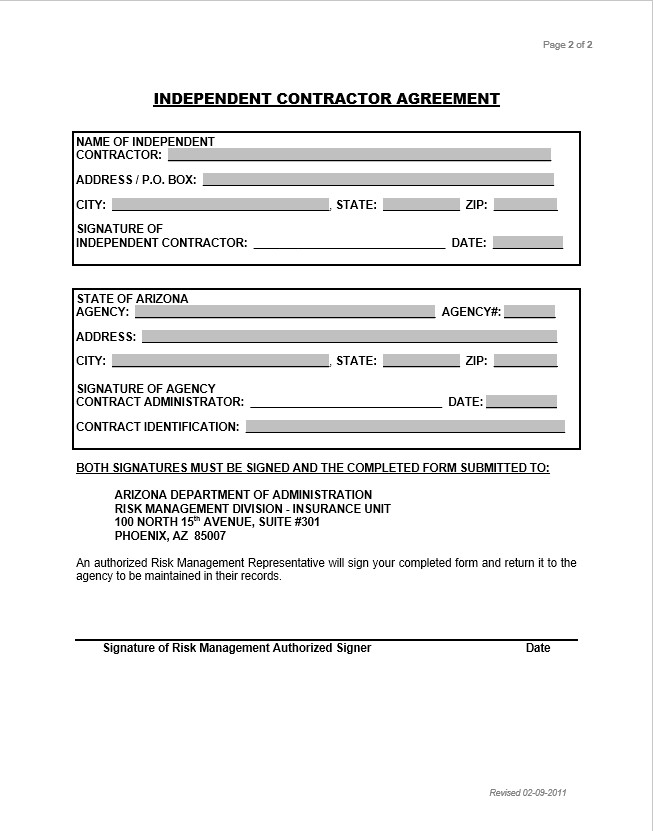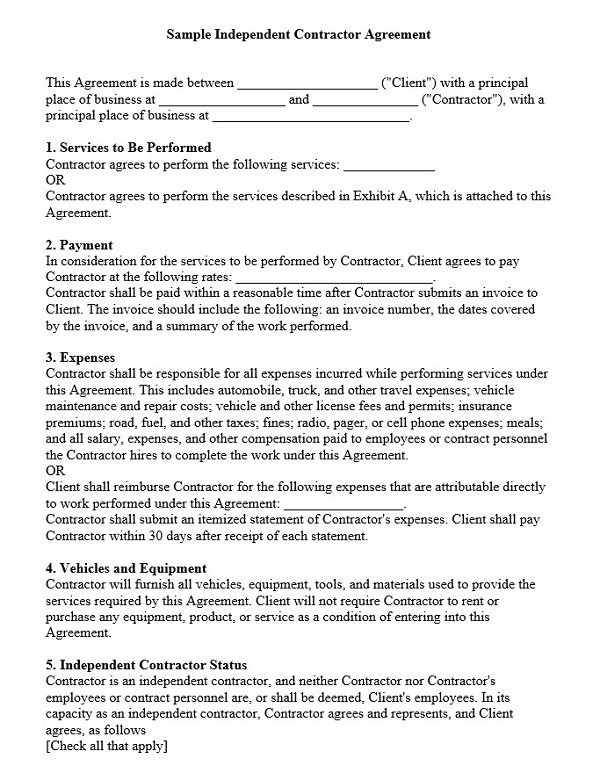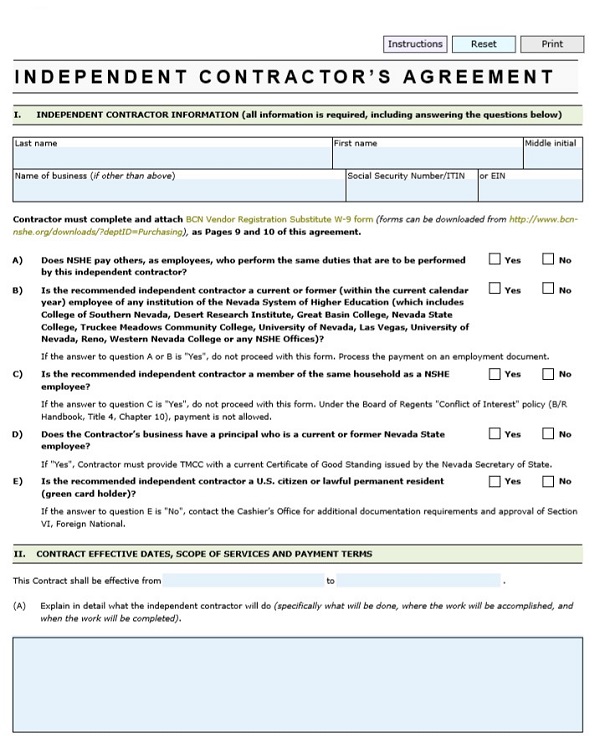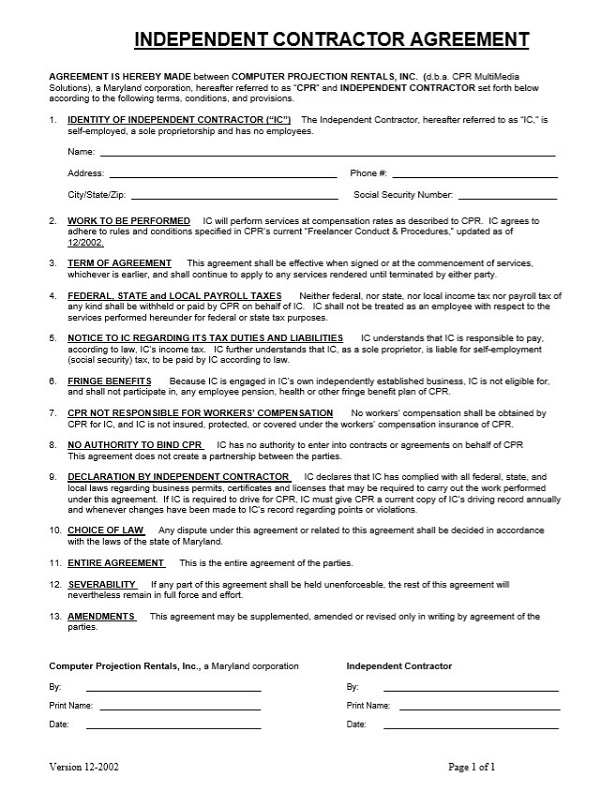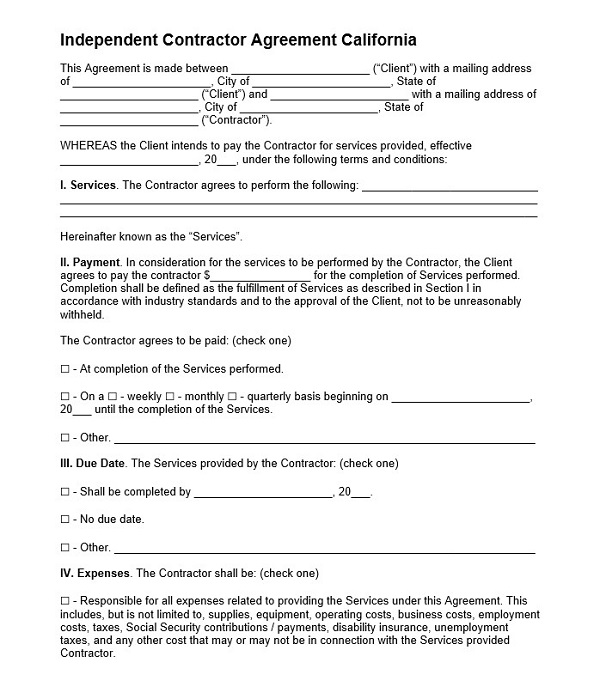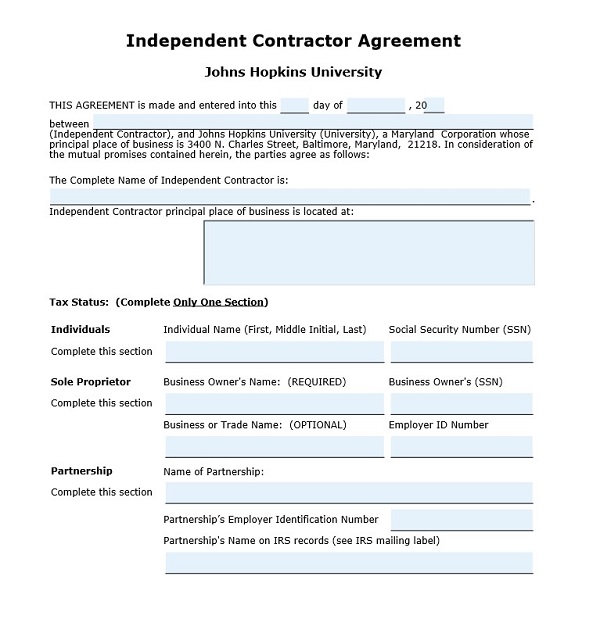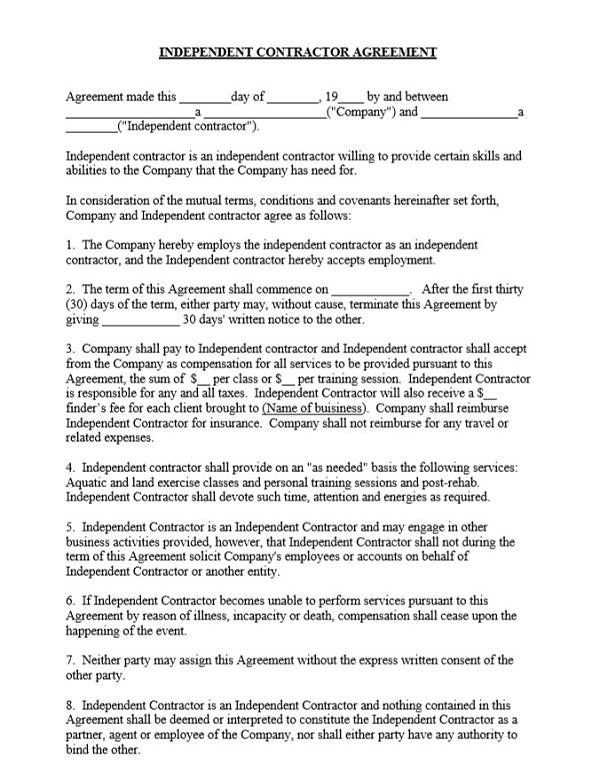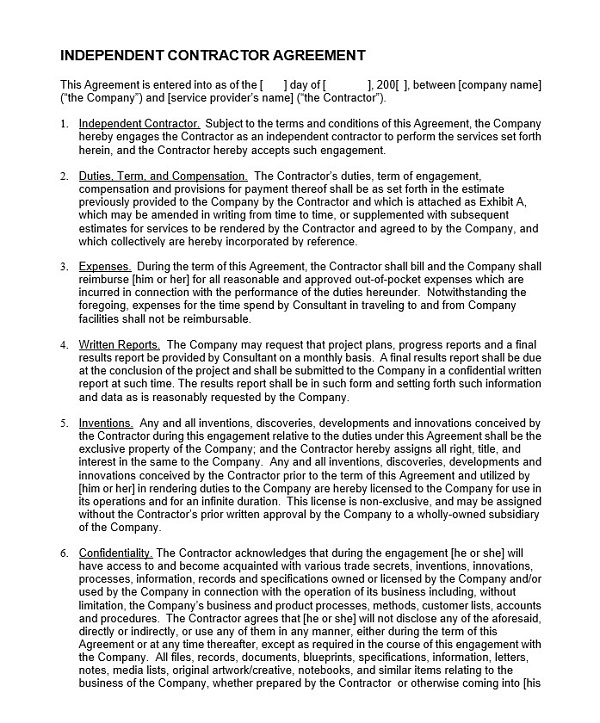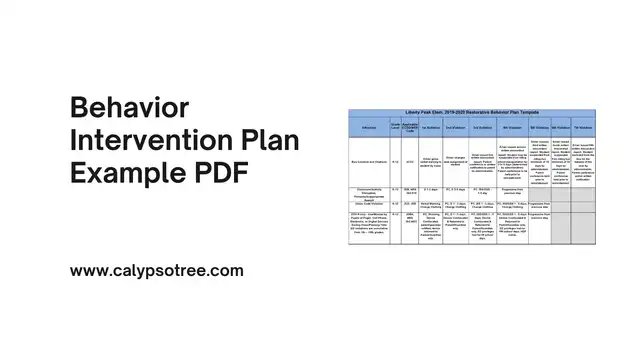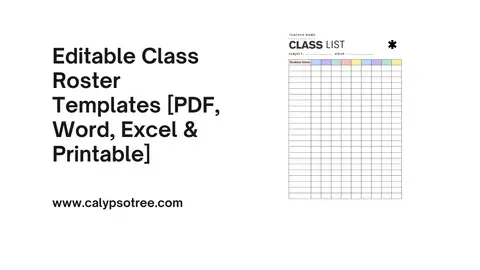Free example of an independent contractor agreement template word & pdf: An Independent contractor agreement must be made when people try to hire an independent contractor for a certain project. There is no doubt that the two parties will need a written contract when they agree to do a specific project or service. People must ensure they understand the difference between the contractor agreement and the employment agreement. Let’s learn more about it!
Basic Elements in the Independent Contractor Agreement
Some basic elements must be included in the contract for hiring an independent contractor.
Hiring Company
Of course, we can ensure that including the hiring company in the agreement is important. The hiring company is the company that needs the service provided by the independent contractor.
Contractor
The contractor is the next crucial element that must be added to the contract. It is necessary to ensure that the independent contractor’s name is clearly revealed in the agreement. The independent contractor can be a company or an individual. They will be hired to complete the task or the project.
Services and Compensation
The contract between the hiring company and the independent contractor is made because there will be a service transaction which will be made. In this circumstance, the independent contractor’s service must be explained properly. When explaining the service, they must include the work product description, which the independent contractor will deliver. It can also be about the particular task which the contractor must perform. Of course, the amount of money and how often the payment is for the hired party must also be included in the independent contractor.
Effective Date and Termination
The project must be completed on time, so it is important to include the effective date in the agreement. It will explain the agreement’s starting and ending date. The termination information must also be included in the agreement. It concerns the condition that can make the hiring company end the contract.
Fringe Benefits and More
This element will state that the independent contractor will not be eligible for sick pay, pension, vacation pay, health benefits, and even unemployment benefits for the employee of the hiring company. The agreement must be written in detail.
Additional Crucial Elements
Additional elements must include the assistants, assignment, binding effect, entire agreement, expenses, governing law, indemnification, insurance, notices, representations, severability, waiver, and warranties for the independent contractor agreement templates.
Assistants:
It refers to whether the contractor can hire someone to help with the work. For instance, if a graphic designer is hired for a project, can they get another designer to assist them?
Assignment:
It is about if the contractor can give the work or responsibilities to someone else. Usually, companies hire a specific contractor because of their skills, so they want to keep the work from being passed to someone else.
Binding Effect:
It means who must follow the agreement. For example, does the new owner have to follow this agreement if the company sells to someone else?
Entire Agreement:
This part says that everything both sides agreed to is in this document. Neither side can later say, “But we also talked about…” if it’s not written in the agreement.
Governing Law:
If there’s a disagreement, which state’s or country’s laws should be used to solve it? It is especially important if the company and the contractor are in different places.
Indemnification:
If the contractor’s work causes a problem or cost for the company, this part says the contractor has to pay for it or fix it.
Insurance:
It says if the contractor needs to have certain insurance. For example, if they could cause damage or get hurt while doing the work.
Notices:
If the company or contractor needs to tell the other something important about the agreement, how should they do it? Email? A letter?
Representations:
It is where each side promises they can and will do what they say in the agreement.
Severability:
Sometimes, a small part of an agreement might not be legally allowed. This section says that if that happens, only that part is removed, and the rest of the agreement still works.
Waiver:
It says that even if one side allows something once (like a late payment), it doesn’t mean they must allow it again.
Warranties:
It is where one side might guarantee something. For example, a contractor might promise their work will be good for a while.
Why Need an Independent Contractor Agreement
Many people or businesses that do specific jobs but aren’t regular employees. It’s very important to have a written agreement when hiring them. Here’s why:
Protection for Everyone:
Having a written agreement is like having a safety net. It ensures the company and the contractor know their rights and duties. There might be clarity with it, and people could get in trouble.
Clear Details:
Every job is different. This agreement contains all the job details so everyone knows what to expect. It helps prevent misunderstandings about money or work.
Setting Boundaries:
It’s good to know what each person should and shouldn’t do. This agreement helps with that. For example, it can say what tools the contractor can use, who they can talk to, or if they can speak for the company in public. Knowing these things helps everyone work better together.
Tips for Drafting an Effective Independent Contractor Agreement:
Be Clear and Specific
Start with a clear title and purpose. Clearly define terms used in the agreement. State what the contractor is expected to do, when, and how.
Outline Payment Details
Mention how much the contractor will be paid, when payments will be made, and the payment method (e.g., check, bank transfer).
Define the Relationship
State that the contractor is not an employee and is responsible for their taxes, insurance, and other benefits.
Confidentiality Clause
If the contractor will have access to company secrets or private information, include a clause that they can’t share this information.
Ownership of Work
State who will own the work once it’s completed. Usually, the company wants to own the results of the contractor’s work.
Termination Terms
Explain when and how either party can end the agreement. It could be after the work is done or if someone needs to do what they promised.
Dispute Resolution
Mention how you’ll solve disagreements. It might be through talking, mediation, or even going to court.
Include a Warranty
The contractor should promise that their work will meet certain standards and that they have the right to do the work they’re being hired for.
Indemnification Clause
It means if the contractor does something that causes the company to lose money, the contractor has to pay for that loss.
Applicable Laws
State which country or state’s laws will be used if there’s a disagreement about the agreement.
Signature and Date
Ultimately, the company and the contractor should sign and date the agreement. It shows that both sides agree to everything written in it.
Review Regularly
Laws and situations change. Review and update the agreement as needed.
Free Example of an Independent Contractor Agreement Template Word & PDF
Sample Independent contractor agreement
Simple Independent Contractor Agreement Template Free
Free independent contractor agreement PDF
Independent Contractor Agreement California
Independent Contractor Agreement PDF
Independent Contractor Agreement Template
One Page Independent Contractor Agreement Templates
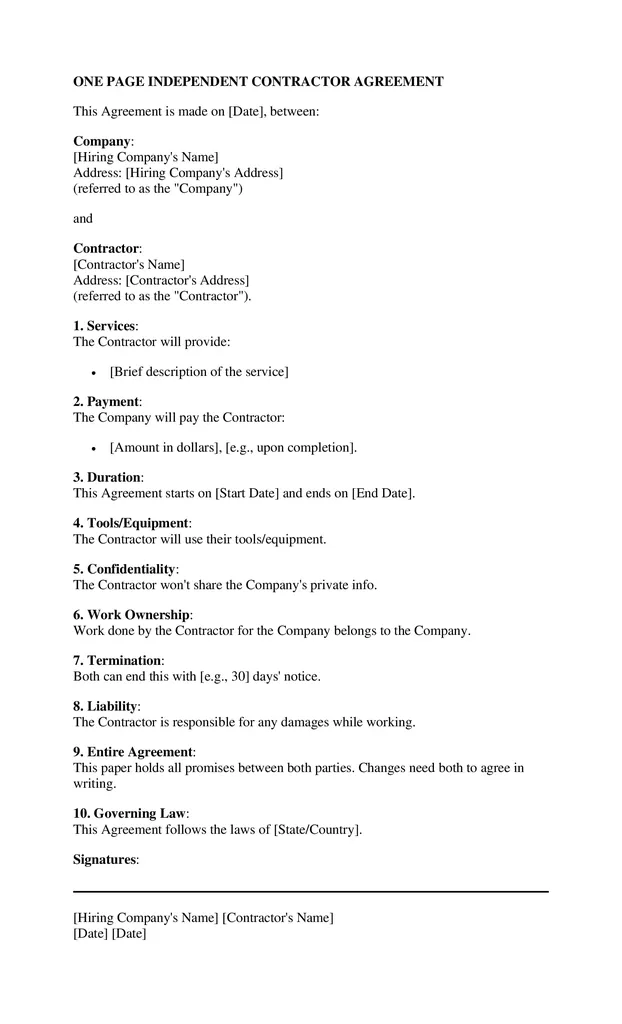
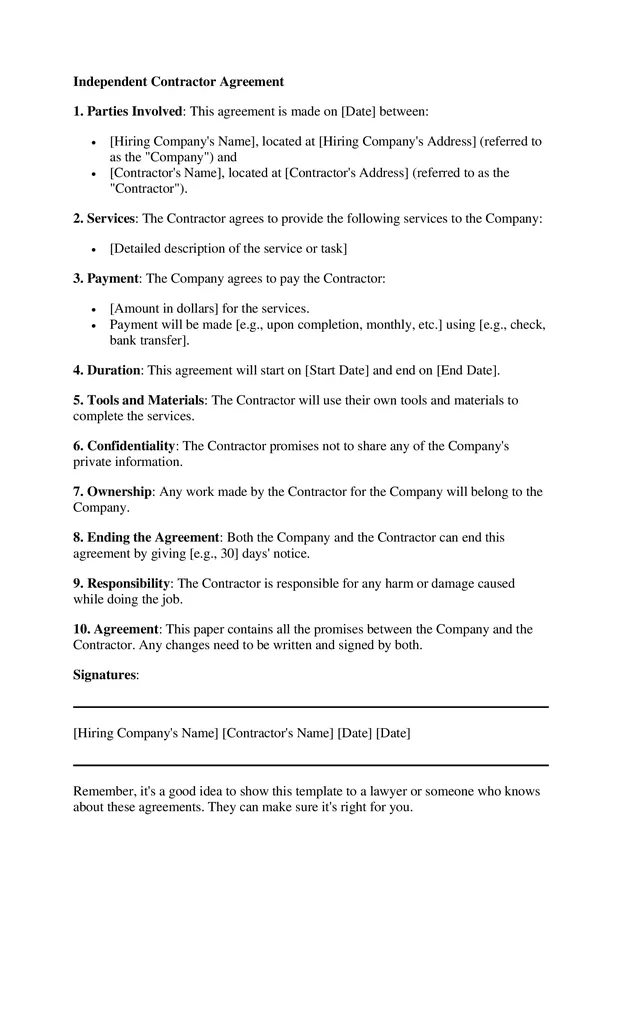
Independent contractor agreement for cleaning service
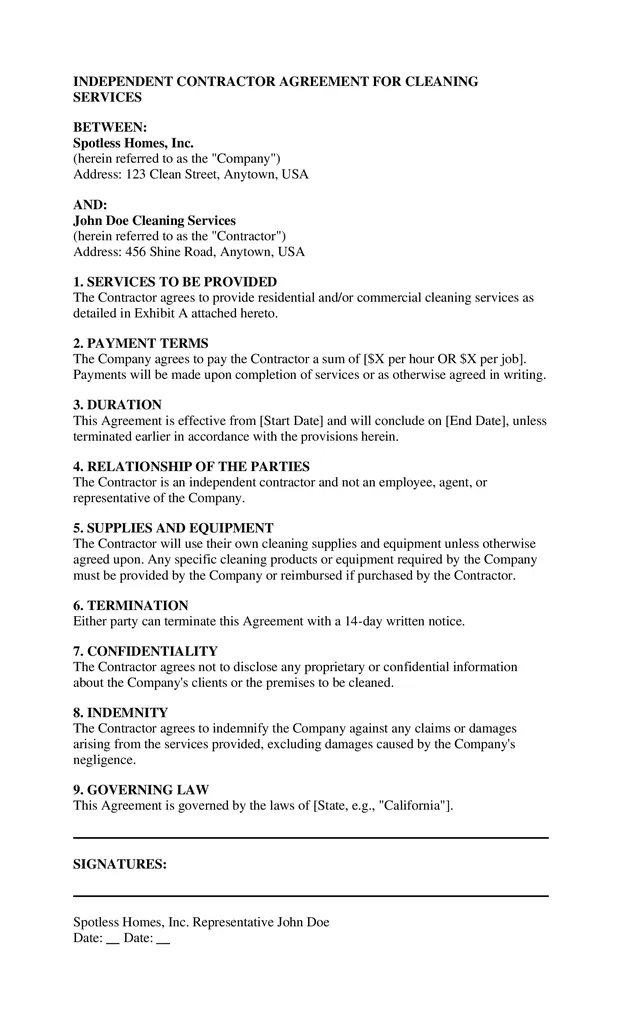
Independent Contractor Agreement Template Between Company
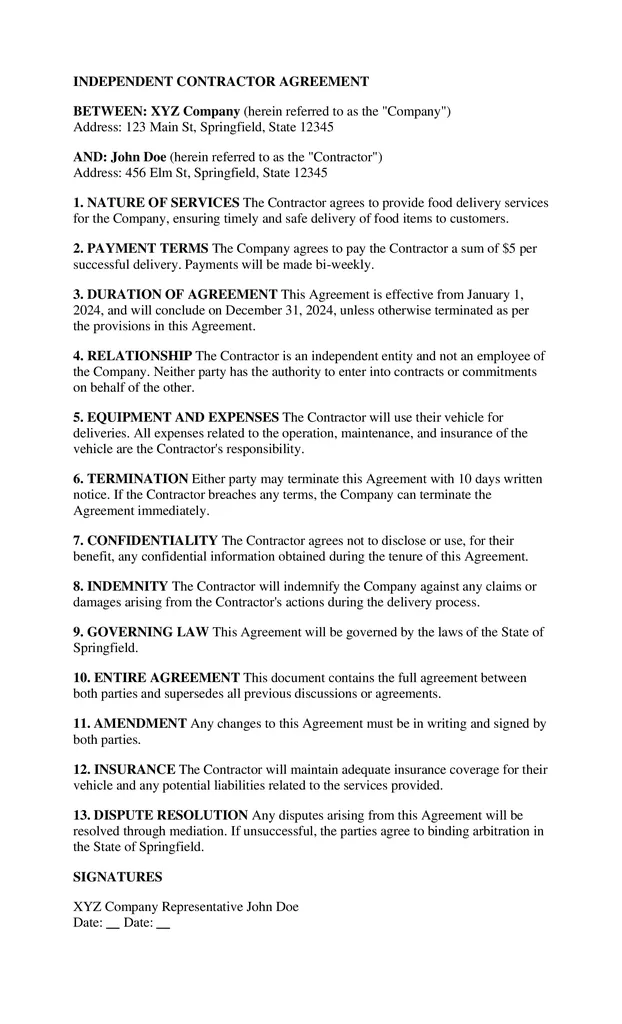
Independent Contractor Agreement Texas
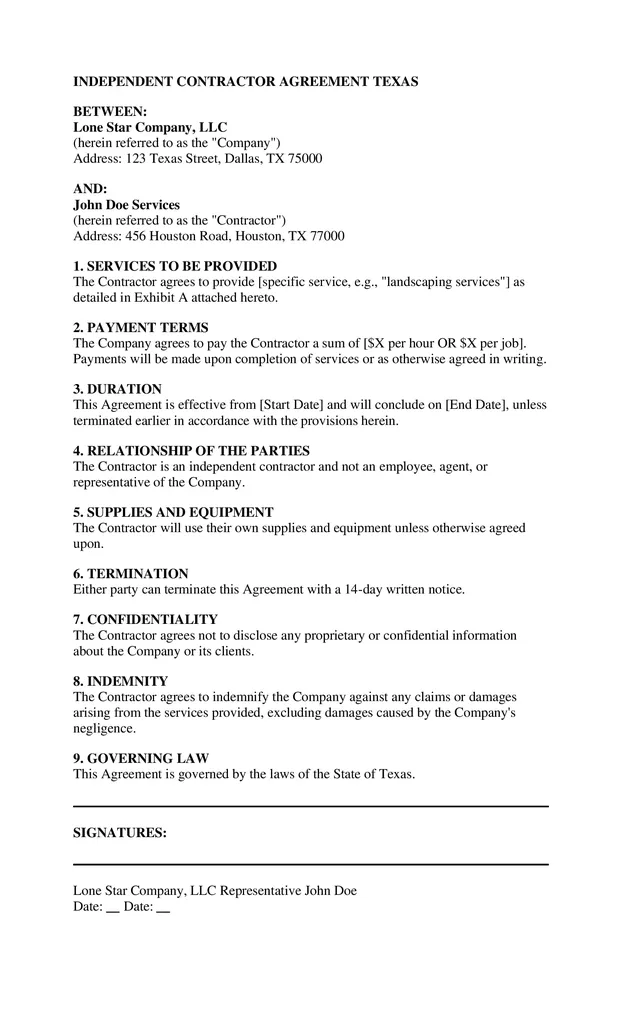
Independent Contractor Agreement California
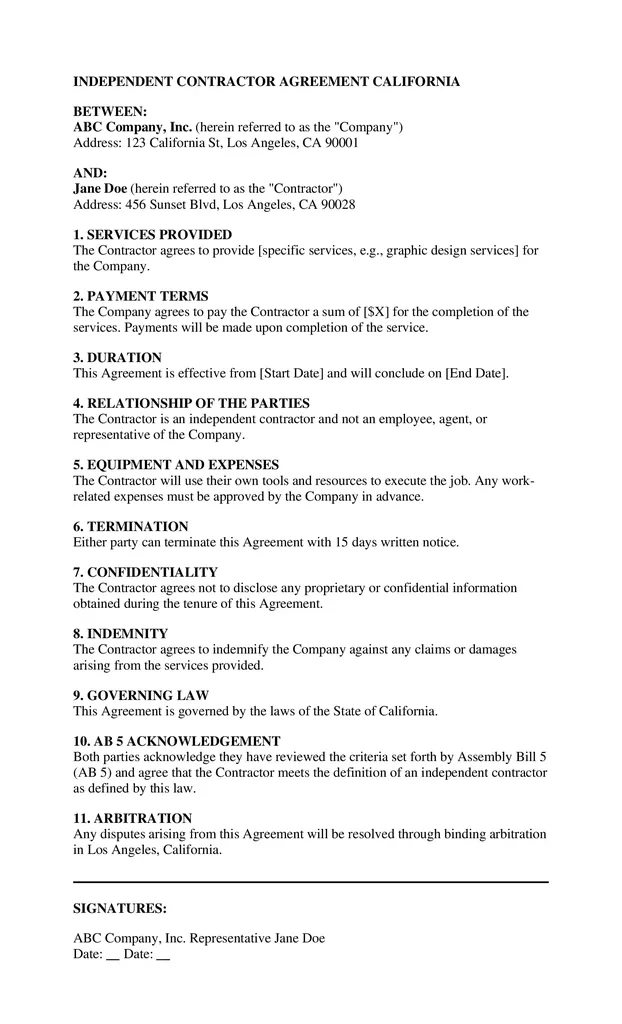
Independent Contractor Agreement Colorado
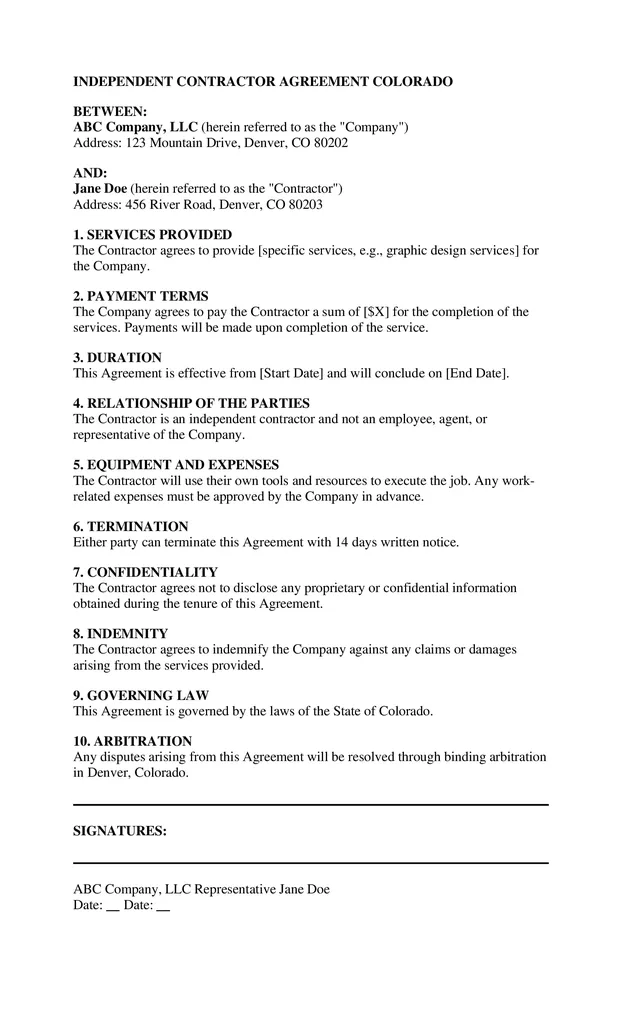
Independent Contractor Agreement Florida
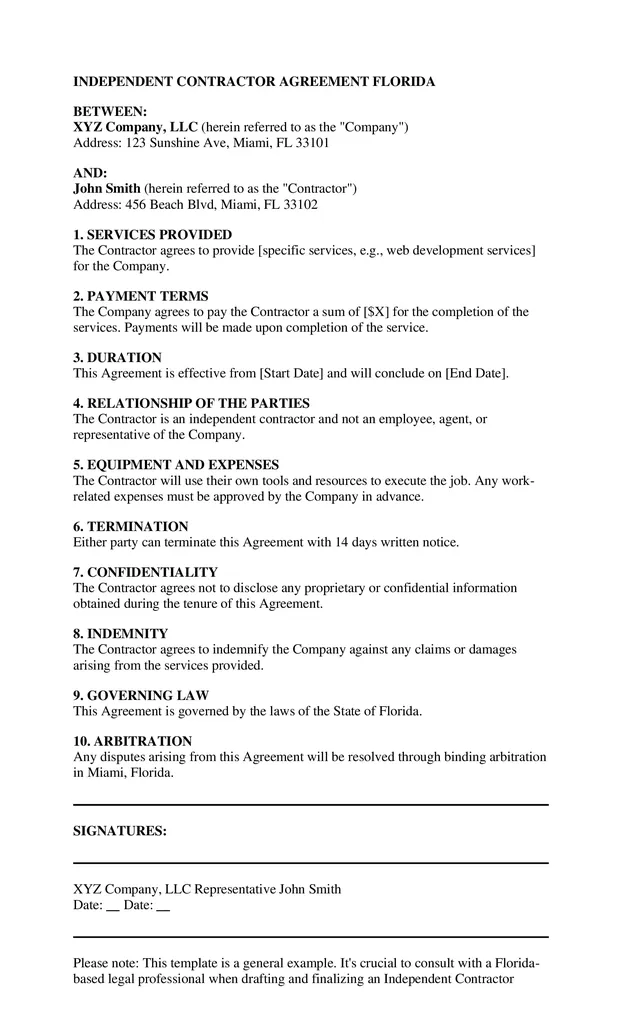
Independent Contractor Agreement Form
How to Fill Out an Independent Contractor Agreement
Start with Both Parties’ Details:
- Write the full name and contact details of the hiring company or person.
- Add the name and contact details of the independent contractor. If it’s a company, provide the company name and representative.
Describe the Services:
- Clearly outline what tasks the contractor is expected to do. Be specific so there’s clarity later.
Set the Payment Terms:
- Decide on the payment amount. It could be a fixed price or hourly rate.
- Mention when and how the contractor will be paid, like through check, bank transfer, etc.
- Note any upfront deposits or retainer fees, if any.
Duration of the Agreement:
- Mention when the contract starts and when it ends.
- If it’s a project-based contract, you might set an end date when the project is expected to be done.
Equipment and Materials:
- State who will provide the tools, equipment, or materials needed. Will it be the contractor or the hiring company?
Confidentiality:
- If the contractor knows company secrets, add rules about not sharing them.
Ownership of Work:
- Clearly, say who owns the work once it’s done. In most cases, the hiring company will own it.
Termination Rules:
- Write down why the hiring company or the contractor can end the agreement.
- Mention if there’s a notice period before ending it.
Insurance and Liability:
- Decide if the contractor needs to have their insurance.
- Mention who will handle any damages or problems.
Governing Law:
- Choose which place’s laws (like a state or country) will be used if there’s a disagreement.
Signatures:
- The hiring company or person and the independent contractor should sign and date the agreement. If the contractor is a company, the company’s representative should sign.
Additional Clauses (if needed):
- Add any other rules or details that are important for the job.
Before filling out the agreement, talking with a lawyer is a good idea. They can make sure everything is correct and protect everyone’s rights.
Once the agreement is filled out and signed, both parties should keep a copy. This way, they can check if there are any questions later.
How to Write an Independent Contractor Agreement
When you hire someone for a special job, it’s good to write everything down. This paper is called an “Independent Contractor Agreement.” It helps everyone know what to do. Here’s a simple guide:
- Title and Date:
- Start with the title: “Independent Contractor Agreement.”
- Write the date and the names of the two people agreeing.
- What’s the job?:
- List what the independent contractor will do.
- Say how and when they should do it.
- How Much Money?:
- Write down how much you’ll pay the independent contractor.
- Say when you’ll pay and how (like cash or check).
- Start and End:
- Write when the Job starts and when it ends.
- If there’s no end date, say how either person can end the job.
- Tools and Stuff:
- Say if the independent contractor brings their tools, or you give them tools.
- Keeping Secrets:
- If the independent contractor learns secrets, they shouldn’t tell anyone.
- Who Owns the Work?:
- Anything the independent contractor makes for you is yours.
- Stopping the Job:
- Say how and when either person can stop the job.
- If Things Go Wrong:
- Say if the independent contractor should have insurance.
- Write who pays if something breaks.
- Which Rules to Follow:
- If you two disagree, say which place’s rules you’ll follow.
- Other Rules:
- Add any other rules you both agree on.
- Signing:
- At the end, both people should sign and date it.
Mistakes to Avoid in Independent Contractor Agreements
- Needs to be clearer on the Job: Always write down exactly what the contractor needs to do. If it needs to be clarified, it can confuse later on.
- Getting the Job Title Wrong: Sometimes people mix up “independent contractor” and “employee.” It can cause big problems with the law and taxes.
- Not Keeping Secrets: If the contractor knows company secrets, ensure there’s a rule about not telling others.
- Not Saying When the Job Ends: It’s important to write down when and how the job can end. If not, people might argue later on.
- Confusing Payment Details: Always be clear about how much, when, and how you’ll pay the contractor. This way, everyone knows what to expect.
- Who Owns the Work?: Always write down who gets to keep the work the contractor does. Say who it belongs to if it’s a drawing, writing, or invention.
- How to Solve Arguments: If there’s a disagreement, plan how to fix it. It might save time and money later on.
- Not Having Safety Rules: The company should be safe from certain problems. Ensure a rule says the contractor will handle any issues they cause.
- Not Saying Which Laws to Follow: Always write down which place’s rules (like a state or country) should be used if there’s a disagreement.
- Not Updating the Agreement: Sometimes, things change, and the agreement gets old. It’s good to check it occasionally to ensure everything’s okay.
Conclusion
Having a clear paper explaining an independent worker’s job is important. This paper helps both the company and the worker understand their work better. It’s like a set of rules they both agree to follow. Our samples and examples are there to help anyone make this paper easily.
To make a good paper for hiring an independent worker, look at our example of an independent contractor agreement. They can help you start. If you need more help or have questions, ask! We made this guide to help everyone understand these papers better. We want everyone to feel safe and know what to expect when they work together.
FAQs
What is an Independent Contractor Agreement?
It’s a written paper where a company and a worker agree on the work the worker will do. This worker isn’t a regular company employee but works on specific tasks or projects.
Why do I need this agreement?
This paper helps both sides know what to expect. It tells the workers what they need to do and the company what they need to pay. It also helps if there are any disagreements later on.
Can I change the agreement once it’s made?
Both sides can agree to change the paper if needed. But it’s important that any changes are written down, and both sides agree to them.
What if the worker doesn’t do what the agreement says?
The paper will have rules about what to do if things don’t go as planned. It might say that the worker won’t get paid or that the company has to find someone else to do the work.
Is this agreement the same as hiring an employee?
No, an independent worker is different from a regular employee. They have their tools, decide how to do the job, and are hired for specific tasks.
Do I need a lawyer to make this agreement?
Having a lawyer look at the paper is a good idea to ensure it’s okay. But you can start with our examples and then ask a lawyer to check them.
How long does the agreement last?
The paper will say how long it lasts. It might be for a certain number of days until a project is done, or it might go on until either side decides to end it.
Can the worker work for other companies, too?
Usually, yes. Independent workers can work for many companies if the paper says they can’t.
What if I could be happier with the worker’s job?
The agreement should have rules about what to do if the company isn’t happy with the work. It might say the worker must fix it, or the company can hire someone else.
Can the worker use other people to help with the job?
The paper will say if the worker can have helpers or not. It’s a good idea to discuss it and decide together if it doesn’t say anything.

The content creator team at calipsotree.com is dedicated to making topics accessible to everyone, with over 9 years of experience in writing and breaking down complex concepts into easy-to-understand articles that answer readers’ financial questions.






